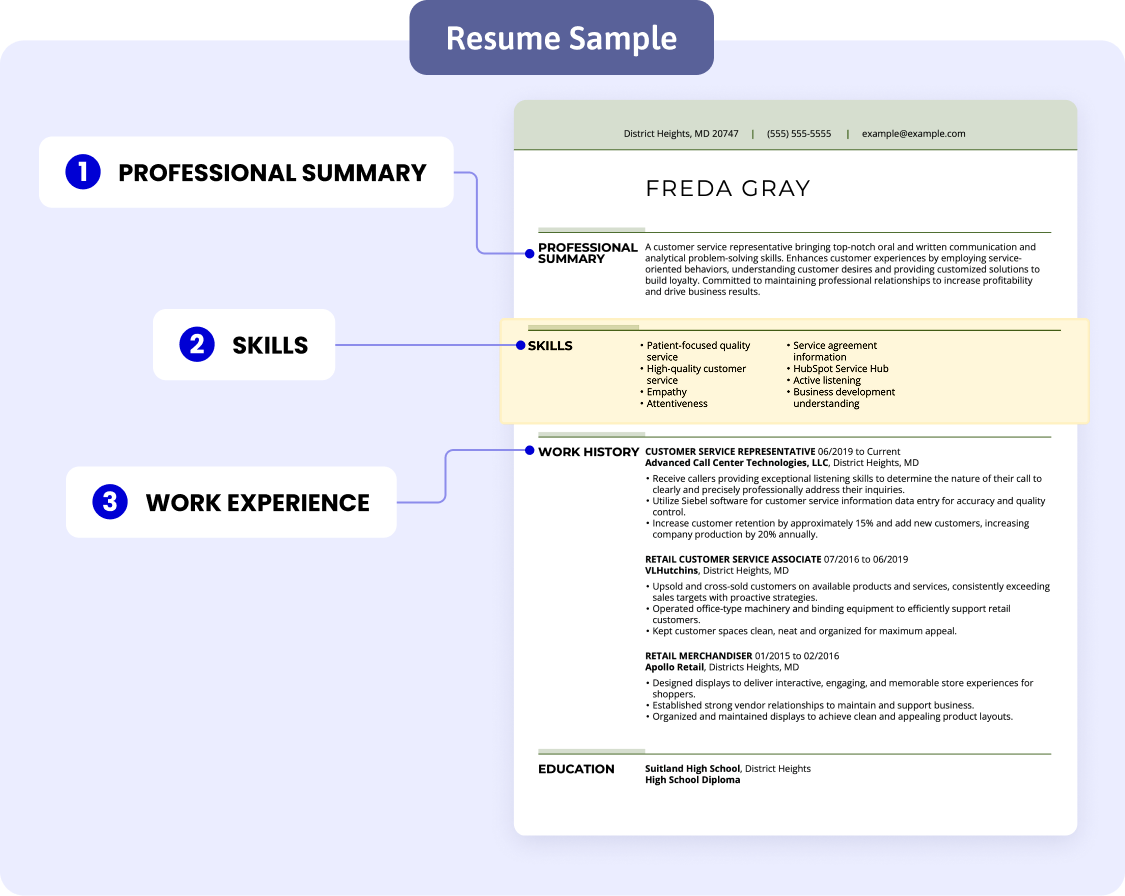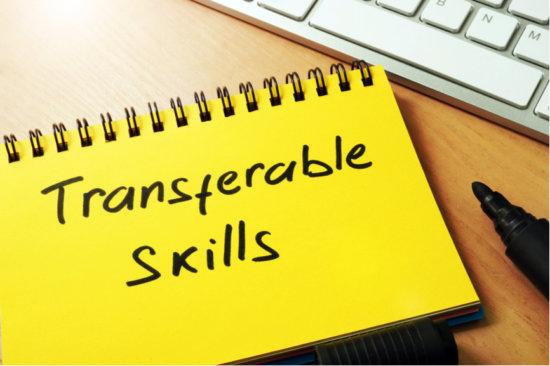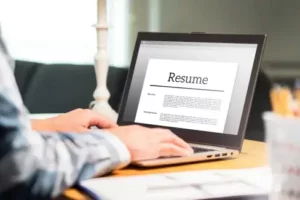How to Improve Communication Skills & List on Resume (75 Examples)
Here, you’ll learn how to improve your communication skills with concrete advice. Plus, you’ll find a list of the top 10 communication skills for resumes expanded into 75+ examples you can use to win a job!
Hired By:*


TABLE OF CONTENTS
What are communication skills?
Communication is a soft skill that refers to how we receive and express ideas, data or information. It’s a broad skill set encompassing:
- Oral communication (e.g., speaking or singing)
- Non-verbal (e.g., body language or sign language)
- Written (e.g., emails, articles or books)
Communication skills include:
- Understanding, sharing and broadcasting information.
- Expressing yourself in a way that others can understand.
- Showing respect and awareness for those around you.
- Being clear about how something is messaged.
- Listening to others and checking to ensure you received their meaning.
Importance of communication skills
Good communication skills are essential to daily life and how you engage friends, family and coworkers.
Employers pay close attention to the communication skills listed on your resume. You must communicate well with managers, colleagues and clients to win or keep a job.
How to improve communication skills
Communication skills are something that you practice every day, yet they can take a lifetime to master!
Developing effective communication skills will enrich all aspects of your life, making work easier and deepening connections and interpersonal skills!
Here are some practical ways to develop your communication skills:
1 Practice active listening
We live in a digital age with many distractions, so showing someone you’re paying attention demonstrates your focus and care.
Put your phone away or face down when talking to someone.
It’s a great tool, but your phone can be a distraction. Even if you’re not using it and it’s on silent, seeing notifications pop up could distract your attention from the person speaking to you. They may see this as rude!
Make eye contact.
If you look into the eyes of the person you’re speaking with, they will feel like they have your full attention. Holding eye contact with them shows confidence and that you value their time.
Nod and make polite verbal affirmations to indicate that you’re listening.
Little signals like nodding your head or making short responsive phrases like “yes,” “no way” or “wow” will help show you’re actively listening to what someone is saying. Just don’t overdo it by interrupting them!
Use facial expressions to show your emotional reaction (when appropriate).
Facial expressions can show warmth and empathy because they indicate that what someone is saying is affecting you emotionally. However, you can also show emotions that may not be welcome, like fear, confusion or anger. Be conscious of how you use facial expressions to show positive emotions and how your facial expressions can betray you.
Repeat some of the key points they shared with you to confirm.
When someone finishes talking or making a point to you, repeating some of the key things they said is good, showing reflective listening. You don’t need to repeat it word-for-word; just show you got the main point.
- Ask questions.
If you’re unclear about anything communicated to you, it’s best to ask a follow-up question that shows your critical thinking skills. Asking questions will help provide clarity and show that you care about what’s being discussed. Try an analogy about what they’ve shared to confirm your understanding.
If someone is explaining a process or something important, you can show that you understand by making a comparison or analogy. For instance, if a hiring manager talked about the importance of preparedness for the job during an interview, you could say something like, “That’s right. Preparation is the key to success!” It shows you’re thinking about what they’re saying and confirms you get the point.
- Accept feedback.
We can all be sensitive or have strong feelings when people give us feedback about ourselves or our performance. However, it rarely benefits you to argue or justify yourself. Even if you disagree, listening and acknowledging what was said works best. Open-mindedness is key to growth.
2.Pay attention to non-verbal signals.
So much of communication is nonverbal. Things like facial expressions, body language, and tone of voice are often done automatically without us thinking about them. However, there’s much to gain for deeper and more assertive communication if you focus on these subtle cues.
Keep an upright posture.
It’s simple, but standing or sitting up straight will give you a more confident presence because it shows alertness and strength.
Be mindful of your facial expressions.
Every social situation is unique, and people reading your facial expressions might react differently. Sometimes, it can help to be expressive and show warmth with your facial expressions. Other times, you may need to keep a serious, calm or collected look. Try to read the tone of the situation and be mindful of your facial expression.
Use your hands.
Hand gestures are a great communication tool. Use your hands to show excitement and hold your listeners’ attention. However, be aware not to move your hands too fast or wildly because this could come off as aggressive or threatening.
Pay attention to what confident people do.
How do they carry themselves? What aspects of their body language can you mimic? Observe how they take up space and what they do with their hands and facial expressions. Try to adapt what seems powerful to you!
3 Improve oral communication.
Oral communication is one of the most important types because it is how people get to deeper levels of understanding and emotional connection. Considering different aspects of how you speak to people can help you get your message across better.
Hear your tone.
The tone of your voice can show how you really feel. If you don’t monitor that tone, you can harm communication by showing unwanted emotions like fear or frustration in settings where they’re not welcome, like a job interview. Always try to keep a positive, friendly tone when appropriate!
Speak clearly.
Be mindful of the pace with which you speak to people. Deliver your words at a steady, medium pace. Make sure you pronounce the words clearly and correctly. It’s good practice to read aloud until you feel your delivery is strong!
Choose your words carefully.
The words you say convey a lot of meaning! So, be thoughtful about them, especially in delicate situations. Prepare what you want to say whenever possible. In conversation, pause to take a moment to think about your word choice before you say it. It can help you avoid miscommunication, hurt feelings or putting your foot in your mouth.
- Give constructive feedback.
When you have to give someone criticism or advice, phrase it in a way that shows you value their thought, effort and work. Constructive criticism means that you’re focused on how they can improve things and less on what they’re doing wrong.
- Build trust.
Being honest about what you say and the promises you make will help build trust and make life much easier. People are much more receptive to what you say when they believe it! Practice public speaking.
Many people fear public speaking, so those who are good at it have a powerful advantage. You’ll probably have to speak in front of an audience at some point, so it’s good to be ready. Practice speeches in non-stressful settings to start: alone in your room, in front of family members or trusted friends. That’ll make it easier for you to speak in front of strangers.
4 Improve your writing.
Developing writing skills can open many doors career-wise. Depending on what kind of writing you want to build, you should:
Start a journal.
One of the easiest ways to get writing practice is to start a journal and commit to writing in it daily. The practice of doing that will help improve your word choice and how you describe things, even if no one else reads it!
Keep it brief!
The best advice for anyone looking to improve their writing skills is to try to convey a message in the fewest words possible. Extra words make your writing less clear and compelling.
Understand your audience.
A clear idea of who you’re writing for can help capture their attention and engagement. So, consider your readers when writing: Who are they? What are their interests, needs, and comprehension levels regarding the subject? The more you put yourself in their shoes, the better you can communicate with them!
Get specialized in writing.
Writing can take many forms, from journalism to copywriting to technical writing. If there’s a style of writing you want to master, put in the work to get good at it! All sorts of books will give you practical guidance about how to write in a specific form. You can also take classes in creative writing or online courses from sites like Udemy or Coursera to hone business writing skills.
Communication skills on a resume sample
To find the best communication skills for a resume, study the job ad to see which skills the employer needs. Be honest and only feature the communication skills you possess.
Here’s an example of communication skills highlighted in a job post for a Spanish teacher:
Key responsibilities:
- Plan, prepare and deliver Spanish language lessons to students at various levels.
- Be fluent in Spanish with an expert authority in Spanish grammar.
- Foster positivity and an inclusive learning environment encouraging active participation and student engagement.
- Assess and track student progress, provide constructive feedback, and implement strategies to help students improve their language skills.
- Develop and implement innovative teaching methods and materials to make learning Spanish exciting and enjoyable.
- Organize and participate in cultural activities, events or clubs related to the Spanish-speaking world.
- Collaborate with colleagues and contribute to the development of curriculum.
- Attend professional development opportunities to stay updated with the latest teaching techniques and trends in language education.
You should mention communication skills in three main places on your resume:
- A devoted skills section.
- The descriptions in your work experience section.
- Your professional summary or objective statement.
Take note there are two main types of skills: hard skills and soft. Communication skills fall under the “soft skills” category.
You need to include a mixture of both on your resume! So, in addition to communication skills, list a few hard skills relevant to the job.
Doing so will ensure you write a resume that gets noticed! You can see where skills are added in this resume example:
If you like the look of this resume, check out our complete library of resume templates! There are options in all three standard resume formats.
Here is an example of communication skills on a resume where you can copy/paste the text:
Communication skills in your cover letter
Your resume and cover letter show employers you’re the best candidate for the job! So, you should also add good communication skills to your cover letter.
Your cover letter is proof of your communication skills. It allows you to express your personality, explain your goals and tell a story about how you used communication skills to solve a problem.
To write a cover letter from scratch, check out our guide on how to make a cover letter. Or, if you want an extra edge, use our Cover Letter Generator.
It walks you through writing a cover letter step by step, like having an expert help you! It even provides text suggestions for the job to which you’re applying. Best of all, it will help you complete a cover letter in just a few quick minutes instead of taking hours!
Key takeaways
To recap, here are the main points about adding communication skills on a resume or cover letter:
- Communication skills benefit both your work and personal life.
- You improve these skills through active practice that focuses on different aspects of communication: listening, speaking, writing and body language.
- Employers need evidence of your communication skills to get hired for any job!
- You should include communication skills on your resume in your professional summary, work experience and as a dedicated “skills” section.
- Your cover letter is living proof of your communication skills! Make sure it is clear, expressive and convincing.
- Ensure that your document contains no mistakes by doing a free Resume Check.
So, if you’re ready to get cracking at your resume and cover letter now, remember that our builder does both!
The last thing you want is to miss out on a job because you still need to send your hiring documents on time!
Communication skills FAQ
What is another word for communication skills on a resume?
Instead of communication skills, you could also say “social skills,” “people skills” or “interpersonal skills.”
These terms basically mean the same thing. The best choice for your resume should reflect what the employer says in the job post or ad.
How do you put communication skills on a resume?
The easiest place to put your communication skills on a resume is in a dedicated skills section.
However, you can also mention communication skills in your work experience, core competencies, professional summary or objective statement.
How do you describe communication skills on a resume?
The best way to describe your communication skills on a resume is by mentioning the impressive results they achieved.
For instance, it’s more convincing to say you “leveraged your communication skills and persuasion to increase sales 34%” than it is just claiming you have “great communication skills.”
What are some good communication skills to put on a resume?
Active listening, following directions and conflict resolution are examples of communication skills that are universally desirable for employers.
However, the best communication skills to put on a resume are the ones the employer requests in the job post or ad. Featuring those will increase your job chances the most.
How do you say you have excellent communication skills on a resume?
You can mention your excellent communication skills in your professional summary or objective statement.
It’s always better to show than tell. So, prove that you have excellent communication skills by ensuring your resume is error-free, easy to read and contains action verbs.
How do you highlight communication skills on a resume?
The closer to the top of your resume that you highlight your communication skills, the more likely an employer will be to see them.
So, list any job essential communication skills near the top of your resume. It will help them get noticed!
Sources
National Institute of Health Director’s Blog “People Read Facial Expressions Differently”
How We Reviewed This Article
Over the past 15 years, we’ve helped more than 10 million job seekers build stronger cover letters, discover their career paths, interview confidently, and boost their chances of finding the right job faster. Review our Editorial Policy to learn more about our process.















